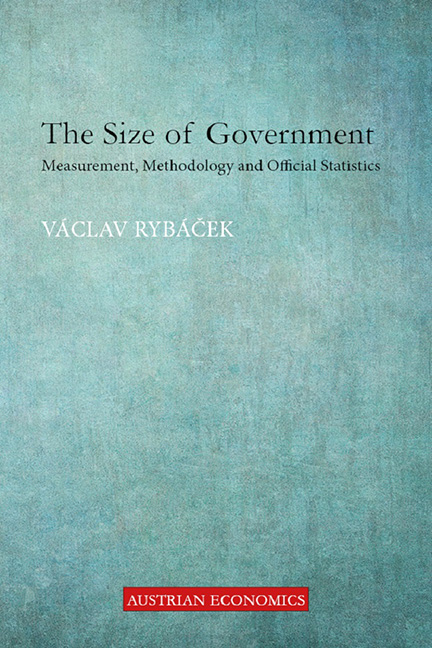Book contents
- Frontmatter
- Contents
- Introduction
- Chapter 1 The Size of Government in Economics
- Chapter 2 The Role of Measuring Government in Economic Policy
- Chapter 3 A Short Trip to the Past
- Chapter 4 The Current Approach
- Chapter 5 What’s Wrong with the Current Approach?
- Chapter 6 The Size of Government and GDP
- Chapter 7 Is the Size of Government Underestimated?
- Chapter 8 Recalculation of the Size of Government
- Conclusion
- Notes
- Bibliography
- Index
Conclusion
Published online by Cambridge University Press: 09 August 2023
- Frontmatter
- Contents
- Introduction
- Chapter 1 The Size of Government in Economics
- Chapter 2 The Role of Measuring Government in Economic Policy
- Chapter 3 A Short Trip to the Past
- Chapter 4 The Current Approach
- Chapter 5 What’s Wrong with the Current Approach?
- Chapter 6 The Size of Government and GDP
- Chapter 7 Is the Size of Government Underestimated?
- Chapter 8 Recalculation of the Size of Government
- Conclusion
- Notes
- Bibliography
- Index
Summary
It was the nineteenth-century British prime minister Benjamin Disraeli who said “There are three kinds of falsehood, lies, damned lies and statistics”. This quip suggests that there are many contradictory stories that can be inferred from statistics and in the previous chapters we hope to have demonstrated that numbers on the size of government are no exception. This field of statistics suffers from many methodological drawbacks discussed above, but the way these figures are understood, interpreted, trusted and (over-)used by users is no less important.
The range of potential statistical outcomes, which depend on the methods applied and the techniques used, which was our aim to show, is something that statisticians do not reveal to end- users, but it is inherent to all statistical products. As we have shown, statistical methods can be applied in different, but meaningful ways, and input data can be rearranged, so that we arrive at very different descriptions of the financial position of governments, as well as the much wider statistical hold of government over the economy. Our arguments have implied that experts, analysts and the public put an excessive faith in the explanatory power of headline statistics and macroeconomic aggregates.
This uncertainty in the currently applied methods manifests itself in unstable and theoretically not well- anchored statistical rules which are still in a state of flux. One of the main issues we’ve discussed is the treatment of market behaviour which is currently not fully understood by compilers as a dynamic equilibrating process, but rather its analysis has been based on a static approach. This has consequences for all key aggregates like GDP, deficit and debt, leading to an underestimation of the statistical size of government. However, we do accept that the methodology has developed in the right direction over recent years. Indeed, the extension of the government sector to include a wider group of public institutions is highly desirable. Nevertheless, the methodology still has some way to go.
We argue that it would be more realistic to interpret officially published figures as the lowest estimation of the government’s influence over society.
- Type
- Chapter
- Information
- The Size of GovernmentMeasurement, Methodology and Official Statistics, pp. 155 - 159Publisher: Agenda PublishingPrint publication year: 2019



